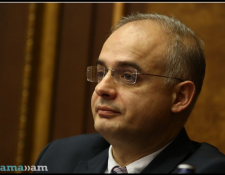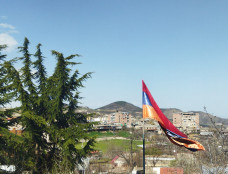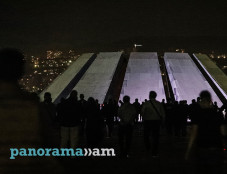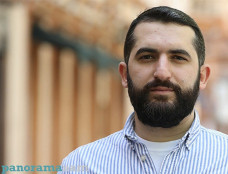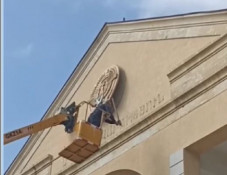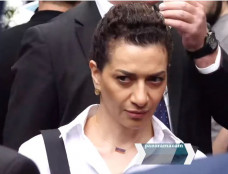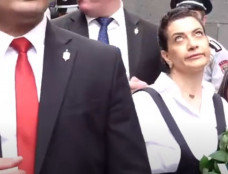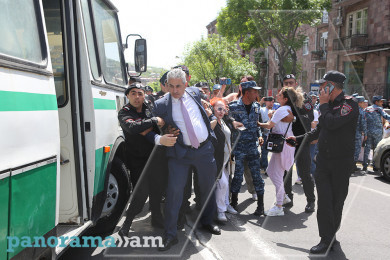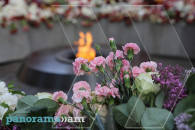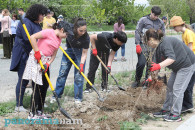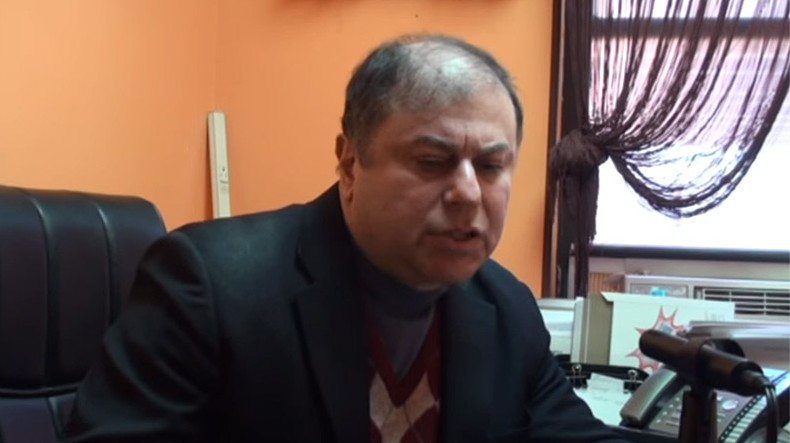
26 years after genocide in Baku: “They marked Armenian flats with crosses to come and attack later”
Panorama.am has already reported that a collection book Baku Tragedy: Eyewitness Accounts is to be published in the frameworks of the project Ordinary Genocide. It will include the interviews of about 50 refugees currently living in the US who speak about their memories. ‘A Century-Long Genocide. Black January of Baku,’ a film, whose presentation took place a year ago, was made based on those accounts.
To commemorate the 26th anniversary of the genocide of the Armenians in Baku, Panorama.am goes on publishing chapters from the future book, provided to the website by Marina Grigoryan, the manager of the project an Ordinary Genocide.
Rudolf AMIRYAN. Lived in Aga Neymatulla Street, settlement Montino, Baku.
I am a native Baku resident. My father was born in Baku in 1925. Everyone in their family worked at tobacco factory. There was a whole museum of Amirovs there. My family name is now spelled Amiryan, but my grandfather, uncle and the rest of our relatives were Amirovs; they had changed their family name in 1918, when a massacre of Armenians was taking place in Baku. The name of my great-grandmother on the mother’s side was Tsaghik-Babo, and my roots are from the Western Armenia on mother’s side.
They fled from Turkey during the Genocide. I remember very well how I went to Tsaghik-Babo as a child, as she recalled her past and told me about the things that had happened in her life. She had three children – Sato, Varso (she was my grandmother Varvara) and Gharib, the family name was Karapetyan. My great-grandmother told me how she had fled with her children and relatives reaching the River Araks to cross it and get in the territory of Armenia to escape the Turkish slaughters during the events at the beginning of the century. It was very difficult to cross Araks, especially with three children. The level of the water was high back then, but there was no other way to escape. My grandmother was the youngest child. And Tsaghik-Babo could take only two of them across the river, holding them on her hands and rising them in the places where the water was particularly high. She had no option; otherwise, they would all be murdered. And she decided to save at least two of the children, the elders. And she left my grandmother under stones in a rock, thinking, God be with this chid, what will be, will be. They had to cross the border as fast as possible; armed with sabres, the Janissaries were catching up on horses and killing.
Those who managed to escape crossed Araks and found themselves in safety on the other side of the river. Frightened to get out of the shelter, they waited until the evening. Then, everyone left but my great-grandmother’s heart could not bear, and she went back, crossed the river again and found her daughter where she had left her! This is how our family on the mother’s side was saved. Tsaghik-Babo often told me this story and I will never forget it. It is hard to recall all those horrors, but in our family, we all remember that and will always remember. My great-grandfather was killed there, too…
Telling us her story over and over again, Tsaghik-Babo started to bewail, but we comforted her, “You don’t need that. We live well here. Turkish, Armenian, there’s no difference, everything is alright.” Still she repeated, “You don’t know what the Turk is.” However, no one paid attention to her words during the Soviet rule. In Baku, we lived in an international atmosphere, we were friends with Azerbaijanis, Russians, Jews and didn’t even think that something like that could happen to us. I lived 30 years in my home, in my yard and always felt the neighbours and acquaintances’ respect towards our family. We were indigenous Baku residents, our grandfather, father and mother worked all their life in one enterprise. This continued until 1988. When ‘sumgait’ happened, it suddenly became clear to us that everything was not so simple. We started to understand that they would start to persecute and kill us just because we were born Armenians.
It was on 27, 28 and 29 of February. We were not clearly aware of what was going on in Sumgait on those days. People actually whispered, shared some rumours, not only the Armenians, also the Azerbaijanis, Russians and representatives of other nationalities. Clearly, the authorities spoke nothing about that. Everything was concealed. Everything was done to avoid a wide public awareness. But everyone understood what was going on and were terrified, even the Azerbaijanis. And there were many Azerbaijanis among our friends. We were all shocked with what had happened in Sumgait.
I stayed in Baku until 31 December 1989. I left everything behind and departed two weeks before the Baku events. I heard so many things during those two years – attacked, beat, slaughtered, raped, murdered… There were almost no Armenians remaining in our yard by that time. There was the Aznauryan family, father Misha, mother Sonya, children Yura, Edik and Leva. They were having hard times, their home was being attacked all the time. They left. Then another family, the third, the fourth… And a moment came when I was left alone. Being an Armenian in Baku in those years meant to be sentenced to death. Knowing their language saved me. When they stopped me in the street to ask me whether I was Armenian, I said, “You are an Armenian yourself.” (They called each other “Armenian.”) I had to defend myself somehow because the Azerbaijanis used to carry their passports with them and show them to the bandits, who were walking in the streets in gangs of 50 or 40 people. These were mainly the members of the Popular Front [party]. They stopped people and checked their nationality. An Armenian, I couldn’t show my passport, that is why I was always surprised at that question with the words, “Why do I need a passport.” I answered them in a good Azerbaijani and they believed.
My father was near 70 at that time. He was beaten twice in Ketskhoveli Street. They had gone up to him and asked, “Are you Armenian?” An old person, he was ashamed to lie that he was not an Armenian. And eight people attacked and beat him. When he came, I saw his ear in blood and wounds all over the body. I asked what had happened. At first, he didn’t tell me, but then he said. Then, it repeated. People were constantly being attacked in our yard. We were afraid to stay at home and sat in the yard. We even made Molotov cocktails with what we could. We thought, if they came into the yard, we must defend ourselves. After all, we were not sheep to let us be easily killed.
People often say the Armenians in Baku didn’t resist, didn’t defend themselves. But we had no arms, while both the authorities and the militia were against us, and it was hard to resist. When a martial law was imposed, soldiers, mainly Russian guys, were standing in the streets. They openly told us that they didn’t even have shells and that they had an order not to shoot. We understood that the whole thing had been organised in advance. When it was already dangerous to be out in the street, we sat at home. But in that case, how did they know that an Armenian lived at that home? Well, they took the lists at the Housing Offices. They came with those lists, knocked at the door and said, “We are from the Popular Front of Azerbaijan.” They said that flat belonged to so-and-so or something else. I had to open the door a couple of times to say Azerbaijanis had bought the flat long ago and no Armenians lived there. Well, I couldn’t go against 20 or 30 people alone. And this didn’t go on for a day or two…
One of my wife’s relatives served a lieutenant colonel at Salyan barracks. I don’t remember his family name any longer, but his first name was Rouben. Once he told me it was time we left Baku, as there was counterintelligence information about pogroms being prepared. I answered, “Aren’t you, a person with rank and position, ashamed to say that? If you know about that, everyone knows – the KGB, Moscow. How can they allow such a thing!” But he said this would certainly happen. We were naïve then, we thought what had happened in Sumgait could not repeat in Baku. Still, it turned out it could, and Moscow was aware of that pretty well. I was convinced of that when this all happened. After all, the Soviet troops had not entered in January to protect the Armenian population. By that time, the Armenians had been persecuted, murdered, beaten and robbed all across Baku for two years already, since 1988. Still, no one paid attention to that. The troops were deployed only in January 1990.
I was fortunate to leave earlier. When they came to seize my flat, we were standing in the street waiting for Rouben, the lieutenant colonel, who was to help us take some of our things to Yerevan. It was on 31 December 1989, that is, two weeks before the pogroms, the mass ones. We were warned that awful events were expected. Exactly in the same way, through ‘the Armenian mail,’ we had been warned in autumn 1988, and it was when many people left Baku, exactly before the earthquake. I first left at that time, and I was in Yerevan during that disaster, but my father and grandpa remained in Baku. And I went back to try to sell our flat. I was offered three thousand roubles for the flat, which cost between 15 and 20 thousand at that time. But we still had to buy accommodation in Yerevan. They set the price – you have a car, so it’s 500 roubles, or take 1000 roubles. Thus, I had to leave everything behind and go away. My flat, that of my wife’s, that of my sister’s. They had been renovating it for two years, but left it, too, and went away without anything, even without documents. Who would give us documents in the Housing Office?..
I can still remember the crosses on the Armenian flats. This is how they marked the Armenians’ homes to come and attack them later. I saw the crosses on the doors myself. It was already during the days when the Popular Front seized the power. The troops actually entered the city to protect the Soviet power rather than to save the Armenians.
I remember another case, too. At my presence, an Armenian woman entered the Montino bazaar and there, some Azerbaijani apparently just showed to her with eyes. It happened very often. At that moment, everyone took kettlebells and started beating to the stalls and shouting. I asked what happened. It turned out they had caught the Armenian. They carried her somewhere but the manager of the bazaar turned up and carried her away from the crowd. I saw myself how she was accompanied out to a microbus. She got inside and the crowd started shaking the vehicle. I phoned the militia and said what was going there. They asked me, “Are you Azerbaijani?” I answered, “Yes.” And the militiaman said, “Then why do you intervene?”
The same thing happened when my mother called the district police department when we lived in Montino. She wanted to set an alarm system in the flat. She was told, “If you are not Armenian, what are you afraid of? The Armenians will all go away from here. So you don’t need to set anything.” This is how we came to realise that we had no protection, neither by the Azerbaijani authorities, nor by the militia, nor by those poor guys who had been taken there unarmed, without the right to shoot.
But we had done nothing bad to anyone. We didn’t kill anyone, both me and my sister received higher education, our whole family, Amirovs, worked at the tobacco factory. My grandfather had worked as head of production for 40 years, and before that, he had been the director. My great-grandmother was married with Arshak Mirzabekyan, who used to be the owner of the tobacco factory before the revolution. We never did anything bad to anyone, only good turns… And only because I was born an Armenian, I needed to be killed.
New York, US. 23 March 2014
A mass pogrom of Armenian population was committed in Baku from 13 to 19 January 1990 as a culmination of the genocide of the Armenians in Azerbaijan unfolded between 1988 and 1990. After the Sumgait pogroms (26-29 February 1988), persecutions, beatings, particularly cruel killings, public mockeries, pogroms of separate flats, seizure of property, forcible expulsions and illegal dismissals of Armenians started in Baku. Only some 35 or 40 thousand Armenians of the community of 250 thousand remained in Baku by January 1990; they were mainly disabled people, old and sick people and the relatives looking after them. The pogroms took an organised, targeted and mass nature since 13 January 1990. A large amount of evidence exists about the atrocities and killings committed with exceptional cruelty, including gang rapes, burnings of people alive, throwing people out of balconies of higher floors, dismemberments and beheadings.The exact number of the victims of the genocide of the Armenians in Baku still remains unknown. According to different sources, between 150 and 400 people were murdered, and hundreds were left disabled. The pogroms went on for a week amid a total inaction of the authorities of Azerbaijan and the USSR, as well as the internal troops and the large Baku garrison of the Soviet Army. Those who managed to avoid death were forced into deportation. The Soviet troops were deployed to set order in Baku only on 20 January 1990.
For more detail, visit KarabakhRecords http://karabakhrecords.info/ru/home-3/.
Related news
- 26 years after genocide in Baku: “My mom listened to Sayat-Nova and cried – her father survived Genocide, then she herself became refugee”
- 26 years after genocide in Baku: “They just threw that young Armenian under train”
- 26 years after genocide in Baku: “Someone informed pogromers that young Armenian woman hid in that house, and they came after me…”
- ‘History repeats itself…’ ‘A Century-Long Genocide. Black January of Baku’ film screened in Richmond
Newsfeed
Videos





